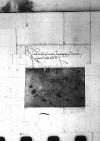List #5727
Sigismund I Jagiellon do Ioannes DANTISCUSCracow, 1546-04-29
| odebrano Wormditt (Orneta), 1546-05-06 Rękopiśmienne podstawy źródłowe:
Pomocnicze podstawy źródłowe:
| ||||||||||
Tekst + aparat krytyczny + komentarzZwykły tekstTekst + komentarzTekst + aparat krytyczny
Reverendo in Christo Patri, domino
Reverende in Christo Pater, domine sincere nobis dilecte.
Litteras Paternitatis Vestrae accepimus, quibus nostris respondet. De
Bene valeat Paternitas Vestra.
Dat(ae) or Dat(um)⌈Dat(ae)Dat(ae) or Dat(um)⌉
Ex mandato s(acrae) or s(erenissimae)⌈s(acrae)s(acrae) or s(erenissimae)⌉ regiae maiestatis proprio


 BNW, BOZ, 953, f. 261v
BNW, BOZ, 953, f. 261v